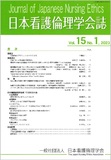Japanese
English
- 販売していません
- Abstract 文献概要
- 参考文献 Reference
- サイト内被引用 Cited by
看護師の倫理的行動と個人・組織特性の関連を明らかにすることを目的に、東海地方の一般病床200床以上の病院に勤務する看護師2,000名を対象として無記名自記式質問紙調査を実施し、331件の有効回答を得た。調査内容は個人特性7項目、組織特性7項目、看護師の倫理的行動尺度改訂版を用いた倫理的行動とした。分析方法は、基本統計量の算出および、個人・組織特性による倫理的行動得点の差の検定を行い、有意差のみられたものは多重比較を行った。その結果、属性による比較では、尺度全体得点において「子どもの有無」、「職位」、「所属病棟診療科」、「時間外労働時間数」で有意な差がみられた。特に「時間外労働時間数」は尺度全体得点及び全ての下位因子で有意な差がみられ、看護師への身体的・精神的負担の増大と同時に倫理的行動にも大きく影響することが明らかとなった。
With the aim of clarifying the relationship between nurses' ethical behavior and individual and organizational characteristics, a self-administered, anonymous questionnaire survey was conducted among 2,000 nurses working at a hospital with at least 200 general hospital beds in the Tokai region, and 331 valid responses were obtained. The survey included seven personal characteristics, seven organizational characteristics, and ethical behaviors using the revised ethical behavior scale for nurses. For the analysis, basic statistics were calculated, and differences in ethical behavior scores by individual and organizational characteristics were tested and multiple comparisons were made for those that showed significant differences. As a result, in the comparison of attributes, significant differences were found in the overall scale scores for “presence of children,” “job position,” “ward department,” and “number of overtime hours worked.” In particular, “number of overtime hours” showed significant differences in the overall scale scores and in all subfactors, indicating that the increased physical and mental burden on nurses has a significant impact on their ethical behavior as well.
Copyright © 2023, The Japan Nursing Ethics Associatin. All rights reserved.


